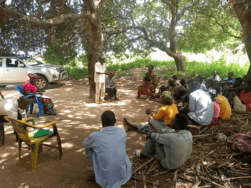Generating Sustainable Livelihoods and Strengthening Social Integration in Mozambique
April 1st, 2024 | News
World Education is excited to announce a new award from the World Bank, through the United Nations Office for Project Services (UNOPS). The Northern Mozambique Rural Resilience Project (MozNorte) aims to generate sustainable livelihoods, strengthen natural resource management in vulnerable communities, promote inclusive and participatory development, and strengthen social integration in Mozambique. It is a 5-year project funded by the World Bank and jointly developed with the Government of Mozambique.
 World Education is leading a consortium to manage the implementation of MozNorte’s Community Driven Development approach through the Community Driven Development Fund. “Based on the needs and priorities communities themselves identify, we will provide grants for more than 100 community projects,” said Obert Darara, Team Lead in Mozambique.
World Education is leading a consortium to manage the implementation of MozNorte’s Community Driven Development approach through the Community Driven Development Fund. “Based on the needs and priorities communities themselves identify, we will provide grants for more than 100 community projects,” said Obert Darara, Team Lead in Mozambique.
Our goal is to stabilize living conditions and create employment and income generating opportunities.”
The consortium will tackle several key issues, including the exclusion of local communities and internally displaced persons (IDPs)—particularly women and youth—from livelihoods that depend on renewable natural resources. It will also address environmental degradation and climate variability, the limited capacity of formal institutions to sustainably and inclusively manage natural resources, and the marginalization of local communities in decisions about natural resource use.
Mozambique has a wealth of natural resources and has passed progressive legislation that gives individuals and communities the ability to secure title and tenure for their land. However, Mozambique is also one of the most vulnerable and least prepared countries for natural disasters. According to the 2021 Global Climate Risk Index, which examines the human and economic impact of extreme weather, Mozambique topped the list in 2019 as the world’s most negatively impacted country. For 2000–2019, Mozambique ranked 5th out of 180 countries.
In response, World Education is partnering with three local NGOs and Verde Azul, a Mozambican consulting company, to help communities in four districts (Eráti, Mecubúri, Memba, and Ribáuè) in the province of Nampula implement climate-sensitive, inclusive, and participatory interventions that build resilience, mitigate risks, and enhance the adaptive capacity of vulnerable communities, especially women, youth, and IDPs.
This project builds on World Education’s work and presence in Mozambique supporting government efforts to improve access to services and economic opportunities for IDPs, deliver quality bilingual education, and strengthen the capacity of local organizations to reduce HIV among vulnerable children and families. It also extends JSI’s portfolio of climate change programming.
The World Bank funds 100 percent of the Community Fund’s total cost of US$13 million through UNOPS award number MOZ/MozNorte/CDDF/23606/2023/001.
World Education fosters enduring partnerships across regions and sectors to advance education outcomes for all. We offer education systems strengthening, program design and implementation, applied research and evaluation, capacity development, and policy development services.